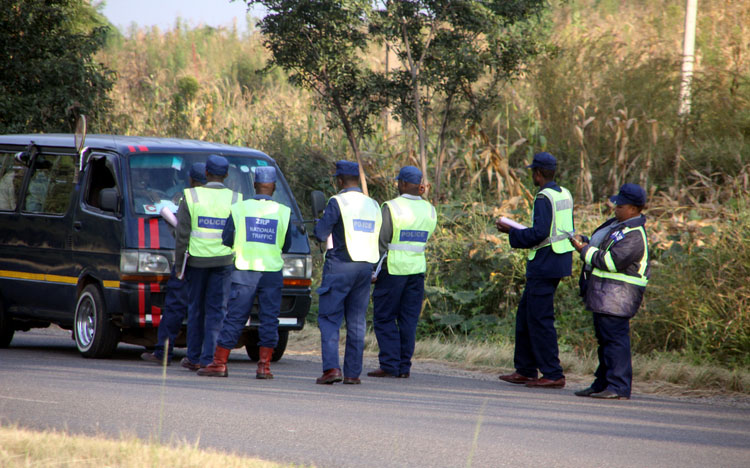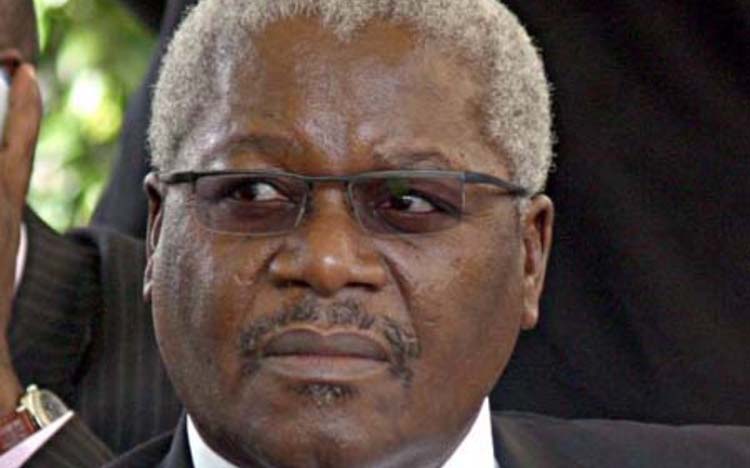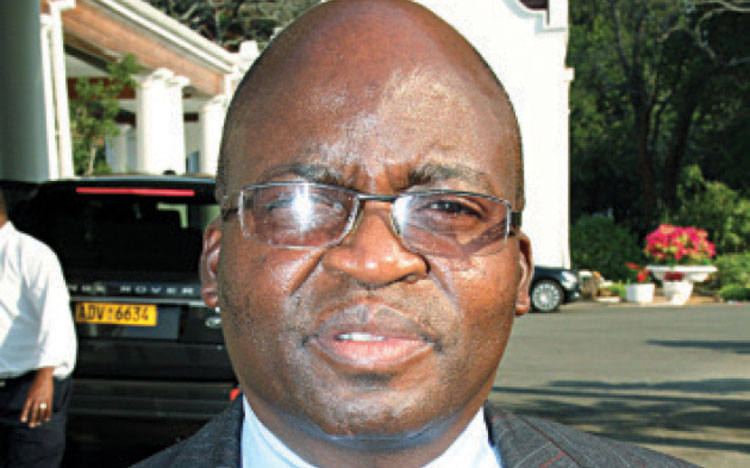
Seven traffic officers “gang up” against a motorist along the Harare-Bulawayo Highway in Warren Park, Harare, recently. — Picture by Innocent Makawa
Sydney Kawadza Senior Features Writer
Reports of reduced police presence on the roads were received first with glee and later with indignation as it emerged that only standard roadblocks would be reduced to four per province.
Home Affairs Minister Ignatius Chombo reportedly told the Parliamentary Committee on Transport and Infrastructure Development that he had directed Police Commissioner-General Dr Augustine Chihuri to remove all unnecessary roadblocks.
The glee turned into gloom as Deputy Minister Abedingwa Mguni clarified the meaning of standard roadblocks that would be reduced. Minister Chombo said the move was Government’s response to concerns raised by tourists and motorists over high police presence on the roads.
“My ministry is concerned about non-compliance by public service vehicles, which have also contributed to a large number of road traffic accidents, whose permits, certificates of fitness, drivers’ licences and route authority permits are generated by both RMT and VID.
“The ZRP will not be able to verify these documents with their hand held gadgets until such a time when RMT and VID have been integrated into CVR, Zinara, Zimra, VTS and ZRP Traffic. “Full integration of these systems will help reduce corruption among ZRP officers, as well as the number of roadblocks our roads,” he said.
He further announced that Government would soon unveil an electronic traffic management system. The system would integrate all transport stakeholders like the police, Vehicle Inspection Department, Zimbabwe National Roads Administration, Road Motor Transport and Central Vehicle Registry (CVR).
This would, he said, bring to an end to traffic management challenges. Minister Chombo said the police is moving towards full a computerisation system using hand held devices to verify the authenticity of documents.
These would include drivers’ licences, Zinara licensing, vehicle insurance, ZBC licensing, permits, transit and cross-border receipts. “It will not be possible for the ZRP to electronically verify documents generated by the VID and RMT. In addition, verification of these documents usually takes a long time, thereby causing delays,” he said.
The Home Affairs Minister further expressed concern on the rampant corruption by traffic officers and the general outcry on the number of roadblocks. Deputy Minister Mguni later said besides corruption, Government wanted to promote the ease of doing business and dealing with issues to do with delays on the roads.
The argument, is therefore that, full integration of these systems will help in reducing corruption among police details and the number of roadblocks on the roads. Hence, the ministry wants to introduce the speedy integration of all traffic management systems. The implementation of the Electronic Traffic Management System would include the installation of integrated centres, deployment of mobile hand-held traffic enforcement devices, speed cameras and an updated vehicle system.
In defining the “standard roadblocks” and why they are mounted, Deputy Minister Mguni, in an interview, said there are three different types in Zimbabwe. “The common is a standard roadblock and, internationally, you are required to set-up visible security barriers such as drums that are painted with visible colours and reflectors.
“They include booms that can stop vehicles with signs that will alert drivers who are about 80 metres away. “Everything should be there including the blue lights because some of these can stretch into the night. “And that roadblock, the standard one, should be manned by more than four traffic officers.”
At the spot checks, he said, police will profile an area where there is always or suspected criminal activity. Police would be in these areas to check whether there are any crimes happening or just showing their visibility, he said. “This is to make sure that crime ridden areas are cleaned up. These are not permanent, you go there, and hit, unexpectedly,” the deputy minister said.
The third, he said, is the highway patrol. “The highway patrol usually has cars that will be driving along the highways and detecting the driving trends on the roads. “They will be checking defective cars and they can stop drivers who will be misbehaving.”
The highway patrol officers, he added, would also be on the lookout for criminals and even trucks with suspicious cargo. “These, in the new system, would be linked to main centres where they can check on registration numbers for verification and vetting,” he said.
In further clarifying the “four roadblocks per province” issue, Deputy Minister Mguni said most capital or major cities in Zimbabwe are built on an almost similar pattern. “We have seen that there are usually four major roads leading to a provincial capital city on which the standard road blocks can be established,” he said.
The deputy minister said Government wants to get rid of permanent roadblocks which are avoided by errant drivers. “The police are strategic and tactful. They do profiling and have intelligence. These four standard roadblocks in a province will be complimented by spot checks and highway patrol and police presence and visibility will be maintained,” he said.
In the new electronic traffic management system, he said, the various Government departments will work together. “We need the VID. They are important because they are the ones that have to check the vehicles’ fitness. “Obviously, if the vehicle has not gone through the VID we are not sure if the vehicle is allowed to use our roads. “We need the MRT, we need the CVR and we need Zimra. We need Zinara and VTS and then the ZRP itself.”
The police, with the electronic gadgets, will get vehicle information on registration and clearance by the departments. He said Minister Chombo will launch the first of the various integrated traffic management system centres to be established across Zimbabwe at Avondale Police Station.
The centres will also receive all information on vehicles using the country’s roads. “The system is similar to those used in other countries like South Africa where a detector is laid on the road and when a car crosses it all information appears on a computer.
“The electronic device will indicate to officers whether the car is cleared to be on the road or there are outstanding tickets or defects. “That is what we call ease of doing business . . . We are looking for people committing crime not interfering with law abiding citizens.”
He said the system would also help to do away with corruption. “Whatever the offence . . . everything would be relayed to the integrated centre where it will show this officer has issued a ticket number to this vehicle. “I am sure you can see at the centre how many tickets would have been issued. “There will never be any negotiations on the road. The police detail punches in the offence and fine charged and it will indicate in the database.”
He said Government had also noted that road carnage was the major crime in Zimbabwe. “I am basing this on the reports we get but I know the number one crime in Zimbabwe is road carnage. This is because there are a lot of fake licences in Zimbabwe.”
He said the VID can claim to have issued about 50 000 licences but that will never correspond with the money they declare to the State. “You can only find that half of these licences were not accounted for. This is because there is no integration,” Deputy Minister Mguni said.
Integration, he said, means the system would upgrade all information in the country’s database as soon as one is sued with a licence. He said compliant motorists will drive smoothly while exposing defiant and errant drivers.
Deputy Minister Mguni said the system has been very effective where it has been implemented. “In South Africa, they have an edge over us because they have got a manufacturing industry within their country and a vehicle is registered within the system as soon as it has been manufactured.
“When a crime has been committed, even going through a traffic light, it will be recorded in the system and wherever you go they will be looking for you with your case number,” he said.
The deputy minister said besides reducing the number of roadblocks, the system will also do away with spot fines. “An officer can let a driver go, knowing that he can pay within seven days and if he doesn’t pay, one day, he will cross that electronic detecting system which will pick up the pending case so the police will stop that person,” he said.
Deputy Minister Mguni said drivers with pending cases would be forced to pay spot fines. “This is working in other countries because all concerns raised are dealt with through the Electronic Traffic Management System.”
In reducing police roadblocks, all rural police stations will confine traffic law enforcement away from the highways in their policing areas. The roadblocks will be manned by the ZRP Traffic Section with each policing district having one on each side of the highway.
For example, the ZRP Rusape District traffic section will have one roadblock between the town and Mutare. Another one would be set up between Rusape and Marondera. The national highway patrol will compliment traffic enforcement through mobile patrols while co-ordinated Government agencies’ roadblocks will be introduced to reduce the numbers.
Police will also introduce more point of sale machines at all traffic enforcements.
- Feedback: [email protected]


